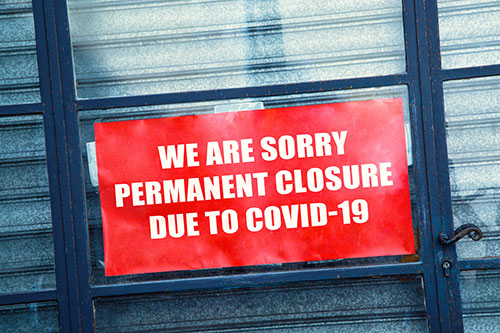This post summarizes an article from McKinsey employees Andre Dua, Kweilin Ellingrud, Deepa Mahajan, and Jake Silberg, in which they explore the industries most vulnerable to Covid-19. The authors segmented small businesses into four main categories (my abbreviations):
Sadly, McKinsey estimates that 25-36% of all small businesses could close permanently due to ripple effects of Covid-19 during just the first four months of the pandemic. However, it should be noted that according to the Federal Reserve, only 35% of all small businesses were in good financial health at the end of 2019 – before the U.S. experienced any effects of domestic exposure to Covid-19. This implies that while some businesses are at risk of closing based on their industry, alterations to consumer behavior, and mandated restrictions due to Covid-19, a large number were at risk of closure even without the pressures of the virus.
While it’s easy to jump to the conclusion that the hospitality industry is most affected by this crisis, industries McKinsey encompasses in their A+F+ segment include: Accommodations and Food Service; Arts, Entertainment, and Recreation; Educational Services; Transportation and Warehousing; Wholesale Trade; and Other (excluding Public Administration). They note that many businesses related to education, arts, and sports are heavily challenged by social distancing requirements. These businesses, as well as medical offices providing elective procedures (such as dental offices) may be affected by patrons’ reluctance to visit.
Included in McKinsey’s A-F+ segment are Construction, Manufacturing, Retail Trade, Administrative & Support, Information Services, and Utilities. Addressing Retail, McKinsey noted the businesses’ strength in weathering Covid-19 was largely affected by whether they were labeled as essential (e.g. clothing was non-essential and suffered, while grocery was essential and thrived). Manufacturing was affected relatively based on the whether the product manufactured was labeled as essential. Again, McKinsey highlights the financial health of various sectors prior to Covid-19, noting that clothing manufacturers tended to have lower liquidity than electronics manufacturers at the start of the pandemic – a factor that played into their lack of resiliency. Construction is an industry which is largely dependent upon the general economic health of the country. McKinsey believes that a drawn-out market recovery could put this industry at significant risk in the future.
In determining how Covid-19 is affecting small businesses in general, McKinsey analyzed multiple surveys, concluding that at minimum, half of small businesses experiencing “large negative effect” are likely to close. At worst, an additional 25% in the “moderate negative effect” range could close. This is especially bad news for minority small business owners, who own 25% of small businesses which are highly affected by Covid-19 and only 15% of small businesses in industries that are largely resilient to issues presented by the virus.
McKinsey offers a plethora of ways in which government and consumers can help small businesses weather the storm:
You can read the full article by following this link: https://www.mckinsey.com/featured-insights/americas/which-small-businesses-are-most-vulnerable-to-covid-19-and-when
- More affected, higher financial risk (A+F+)
- More affected, lower financial risk (A+F-)
- Less affected, higher financial risk (A-F+)
- Less affected, lower financial risk (A-F-)
Sadly, McKinsey estimates that 25-36% of all small businesses could close permanently due to ripple effects of Covid-19 during just the first four months of the pandemic. However, it should be noted that according to the Federal Reserve, only 35% of all small businesses were in good financial health at the end of 2019 – before the U.S. experienced any effects of domestic exposure to Covid-19. This implies that while some businesses are at risk of closing based on their industry, alterations to consumer behavior, and mandated restrictions due to Covid-19, a large number were at risk of closure even without the pressures of the virus.
While it’s easy to jump to the conclusion that the hospitality industry is most affected by this crisis, industries McKinsey encompasses in their A+F+ segment include: Accommodations and Food Service; Arts, Entertainment, and Recreation; Educational Services; Transportation and Warehousing; Wholesale Trade; and Other (excluding Public Administration). They note that many businesses related to education, arts, and sports are heavily challenged by social distancing requirements. These businesses, as well as medical offices providing elective procedures (such as dental offices) may be affected by patrons’ reluctance to visit.
Included in McKinsey’s A-F+ segment are Construction, Manufacturing, Retail Trade, Administrative & Support, Information Services, and Utilities. Addressing Retail, McKinsey noted the businesses’ strength in weathering Covid-19 was largely affected by whether they were labeled as essential (e.g. clothing was non-essential and suffered, while grocery was essential and thrived). Manufacturing was affected relatively based on the whether the product manufactured was labeled as essential. Again, McKinsey highlights the financial health of various sectors prior to Covid-19, noting that clothing manufacturers tended to have lower liquidity than electronics manufacturers at the start of the pandemic – a factor that played into their lack of resiliency. Construction is an industry which is largely dependent upon the general economic health of the country. McKinsey believes that a drawn-out market recovery could put this industry at significant risk in the future.
In determining how Covid-19 is affecting small businesses in general, McKinsey analyzed multiple surveys, concluding that at minimum, half of small businesses experiencing “large negative effect” are likely to close. At worst, an additional 25% in the “moderate negative effect” range could close. This is especially bad news for minority small business owners, who own 25% of small businesses which are highly affected by Covid-19 and only 15% of small businesses in industries that are largely resilient to issues presented by the virus.
McKinsey offers a plethora of ways in which government and consumers can help small businesses weather the storm:
- Provide relief that focuses on improving revenue and reducing cost
- Offer new or special forms of credit for small businesses that don’t currently have banking relationships
- Prioritize small business in procurement
- Change payment terms to “30-days” or “due upon receipt” to give small business owners faster access to cash
- Relax payment schedules on loans
- Provide government supplied PPE for small businesses
- Establish local portals to provide funds for implementing physical distancing
- Provide means for small businesses to upgrade their facilities and improve training programs
- Shop at small businesses as opposed to big box stores whenever possible
- Purchase from large companies which use small businesses as suppliers
You can read the full article by following this link: https://www.mckinsey.com/featured-insights/americas/which-small-businesses-are-most-vulnerable-to-covid-19-and-when

